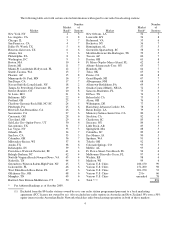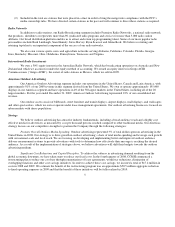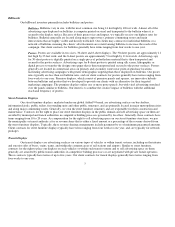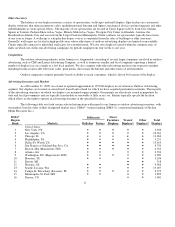iHeartMedia 2009 Annual Report Download - page 17
Download and view the complete annual report
Please find page 17 of the 2009 iHeartMedia annual report below. You can navigate through the pages in the report by either clicking on the pages listed below, or by using the keyword search tool below to find specific information within the annual report.
Employees
As of March 10, 2010, we had approximately 14,980 domestic employees and 4,315 international employees, of which
approximately 18,413 were in operations and approximately 882 were in corporate related activities. Approximately 398 of our
United States employees and approximately 337 of our non-United States employees are subject to collective bargaining agreements
in their respective countries. We are a party to numerous collective bargaining agreements, none of which represent a significant
number of employees. We believe that our relationship with our employees is good.
Federal Regulation of Radio Broadcasting
General: Radio broadcasting is subject to the jurisdiction of the Federal Communications Commission (“FCC”) under the
Communications Act of 1934, as amended (the “Communications Act”). The Communications Act permits the operation of a radio
broadcast station only under a license issued by the FCC upon a finding that grant of the license would serve the public interest,
convenience and necessity. Among other things, the Communications Act empowers the FCC to: issue, renew, revoke and modify
broadcasting licenses; assign frequency bands for broadcasting; determine stations’ frequencies, locations, power and other technical
parameters; impose penalties for violation of its regulations, including monetary forfeitures and, in extreme cases, license revocation;
impose annual regulatory and application processing fees; and adopt and implement regulations and policies affecting the ownership,
operation, program content and employment practices of broadcast stations.
License Assignments: The Communications Act prohibits the assignment of a license or the transfer of control of an FCC
licensee without prior FCC approval. Applications for assignment or transfers that involve a substantial change in ownership or
control are subject to a 30-day period for public comment, during which petitions to deny the application may be filed.
License Renewals: The FCC grants broadcast licenses for a term of up to 8 years. The FCC will renew a license for an
additional 8 year term if, after consideration of the renewal application and any objections thereto, it finds that: the station has served
the public interest, convenience and necessity; and that, with respect to the station up for renewal, there have been no serious
violations of either the Communications Act or the FCC’s rules and regulations by the licensee, and there have been no other such
violations by the licensee which, taken together, constitute a pattern of abuse. The FCC may grant the license renewal application
with or without conditions, including renewal for a term less than 8 years. The vast majority of radio licenses are renewed by the
FCC. Historically, all of our stations’ licenses have been renewed.
Ownership Regulation: The Communications Act and FCC rules limit the official positions and ownership interests,
known as “attributable” interests, that individuals and entities may have in broadcast stations and other specified mass media entities.
Under these rules, attributable interests generally include: officers and directors of a licensee or of its direct or indirect parent; general
partners, limited partners and limited liability company members, unless properly “insulated” from management activities; a 5% or
more direct or indirect voting stock interest in a licensee, except that, for a narrowly defined class of passive investors, the attribution
threshold is a 20% or more voting stock interest; and combined equity and debt interests in excess of 33% of a licensee’s total asset
value, if the interest holder provides over 15% of the licensee station’s total weekly programming, or has a an attributable broadcast,
cable or newspaper interest in the same market (the “EDP Rule”). An entity that owns one or more radio stations in a market and
programs more than 15% of the broadcast time, or sells more than 15% per week of the advertising time, on a radio station in the
same market is generally deemed to have an attributable interest in that station.
Debt instruments, non-voting stock, minority voting stock interests in corporations having a single majority stockholder,
and properly insulated limited partnership and limited liability company interests generally are not subject to attribution unless such
interests implicate the EDP Rule. To the best of our knowledge at present, none of our officers, directors, or 5% or greater
shareholders holds an interest in another television station, radio station, cable television system, or daily newspaper that is
inconsistent with the FCC’s ownership rules.
The FCC is required to conduct periodic reviews of its media ownership rules. In its 2003 media ownership decision, the
FCC, among other actions, modified the radio ownership rules and adopted new cross-media ownership limits. Numerous parties,
including us, appealed the decision. The United States Court of Appeals for the Third Circuit initially stayed implementation of the
new rules. Later, it partially lifted the stay as to the radio ownership rules, allowing the modified rules to go into effect. It retained the
stay on the cross-media rules, and remanded them to the FCC for further justification. In December 2007, the FCC adopted a decision
that revised the newspaper-broadcast cross-ownership rule, but made no changes to the radio ownership or radio-television cross-
ownership rules. This decision, including the determination not to relax the radio ownership limits, is the subject of a request for
reconsideration and various court appeals, including by us. We cannot predict the outcome of the FCC’s media ownership
proceedings or their effects on our business in the future. The FCC’s next periodic review is scheduled to begin in 2010.
14
























